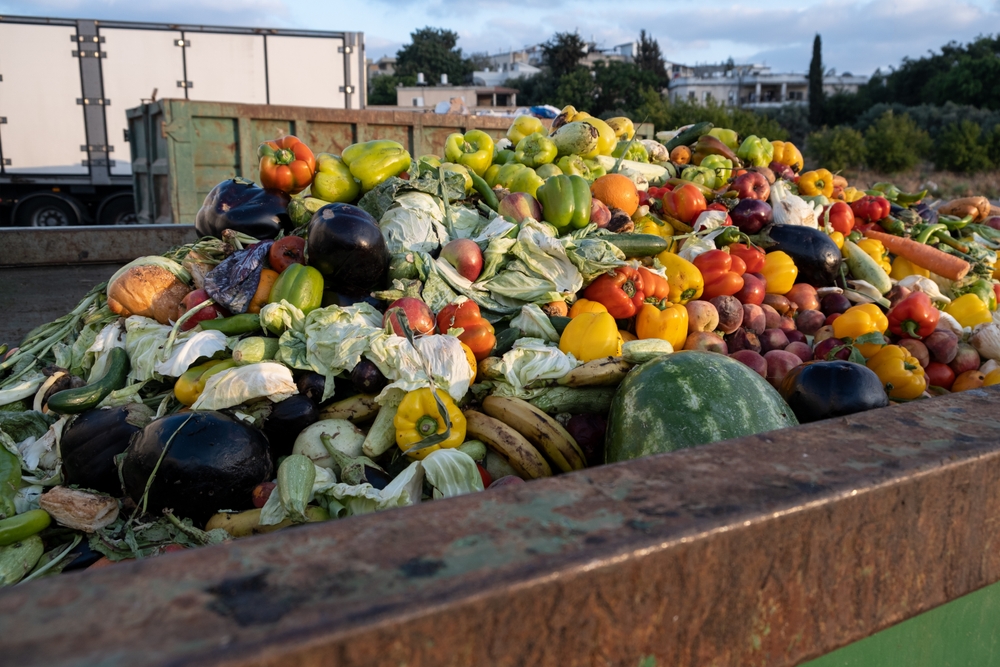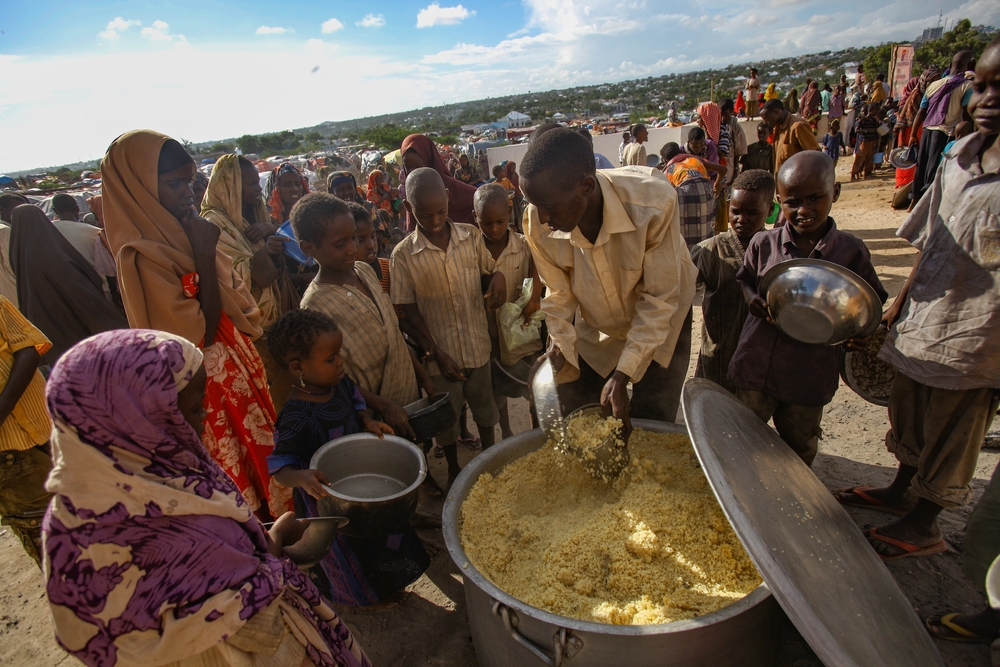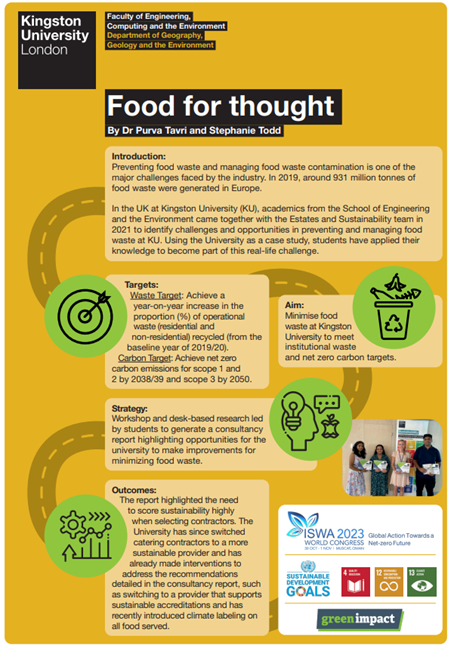Lorem ipsum dolor sit amet, consectetur adipiscing elit. Curabitur eleifend tortor nec augue pretium


Two of the major challenges facing the food waste management industry is contamination and waste prevention. Reuse, closing the loop, reverse logistics and repurposing are some of the techniques discussed and applied in the industry.
Nonetheless, techniques for optimum use of resources are not limited to materials, but can also be applied to bring system change.
Using the case of minimising food waste at Kingston University, this discussion piece demonstrates a step towards system change by tapping into existing resources through collaboration and inclusivity. The aim is to contribute towards the discussion around current uncertain times, where being resourceful is not just limited to materials but needs to be integrated into the heart of the organisational strategy, systems and procedures.
Food waste is not a novel issue but has been overlooked for decades. Photographer Peter Menzel set out during the early 2000s to capture what families around the world eat in a week. He found that, compared with city-centred families, village-centred families seem to eat a wider variety of locally sourced unpackaged food.
Menzel’s book Hungry Planet demonstrates the nutritional disparity between developing countries and their affluent counterparts. On the other hand, it presents a juxtaposition of efficient use of resources (such as reusable packaging) by developing countries versus convenient, but wasteful consumerism patterns (such as packaged foods) by their affluent counterparts.

This shows that the modern economy is built on the continuous expansion of material consumption, which is regarded as an index of social progress (Baudrillard, 1998). This is even though people in developing nations such as Sub-Saharan Africa and Oceania (excluding Australia and New Zealand) are vulnerable because of food insecurity. A World Bank study in 2023 shows that Sub-Saharan Africa and Oceania continue to suffer from food insecurity, with projected rates of up to 48.6% and 32.5% respectively by 2030. Furthermore, the study indicates that, as a result of multiple crises, including the Covid-19 pandemic, climate change and armed conflicts, globally, food insecurity rose from 25.3% in 2019 to 29.6% in 2022.
We are living in an era of uncertainties, and being resourceful is ever-more crucial to overcome the challenges. The power of collaboration brings resourcefulness and ideas, boosting inclusivity and longevity.
In 2018, the UK recorded around 9.5 million tonnes of food waste, which accounts for over £19bn a year and 36 million tonnes of greenhouse gases (WARP, 2022; ONS, 2021). Of this waste, 71% comes from households, but this is also identified as a key issue for universities. According to The University Caterers Organisation (TUCO, 2016) about 13% of food waste is generated in the education sector.
At Kingston University , we initiated a pilot scheme to encourage systemic change by tapping into existing resources and creating a closed-loop system. Academics from the School of Built Environment and Geography came together with the estates and sustainability team to identify challenges and opportunities in preventing and managing food waste at the university.
The plan was instigated in 2021, when an MSc dissertation topic ‘investigating the use of compostable materials as a climate change mitigation strategy’ was proposed to environmental management students. They used a mixed-method approach that involved, first, a comparative assessment of primary and secondary waste data and, second, a qualitative analysis to review waste management practices at Kingston University. The qualitative method was chosen to avoid bias and to develop and provide a view of the phenomena, particularly involving the uniqueness of human interaction and behaviour, while considering several individual variables. The dissertation provided facts on the amount of compostable waste being generated. It further highlighted a lack of awareness of correct disposal methods among staff and students, which led to contamination being a major issue.
Recognising the gaps from the above study, in 2022, the academic and operational team created a follow-up project for five undergraduate environmental science degree apprentices – a 10-week workshop on developing opportunities and recommendations for Kingston University to minimise food waste. The study involved desk research, with the 2021 MSc study forming part of the literature review, followed by attending the Circular Food Sprint for London Higher Education at the University of Westminster, and, lastly, conversations with Kingston’s operational sustainability manager, catering manager and head chef. The degree apprentices were asked to produce a consultancy report based on their study.
The report highlighted the need to score sustainability highly when selecting contractors. In particular, it showcased the various types of accreditation – such as the Food Made Good accreditation from the Sustainable Restaurant Association, the Food for Life Served Here accreditation, and the Green Kitchen Standard – the value they could bring and their ratings against sourcing, society and environment criteria.
Kingston University has since switched its catering contract to a more sustainable provider and has already made interventions to address the recommendations detailed in the consultancy report, such as using providers that support sustainable accreditations and introducing climate labelling on all food served. It has also created a job opportunity for an environment and sustainability engagement officer, which has been filled by a student from the university’s current environmental management master's programme.
Furthermore, the project received national and international recognition and has resulted in knowledge exchange. It was recognised at the 2023 Green Impact National Awards as a joint runner-up for the Environmental Improvement Award, for the impactful reduction of food waste. Findings from the project were shared internationally at the International Solid Waste Association World Congress 2023 in Oman (see presentation below).

Both studies enabled Kingston University to identify gaps associated with food waste prevention and management, and, using the university as a case study, students have applied their learnings to a real-life challenge. By bringing together sustainability expertise across academia and operations, we enabled the students to develop transferable knowledge, skills and behaviours, and provided the university with a robust and valuable report, setting out recommendations on minimising food waste. Activities such as these stand as a further demonstration that circularity or optimum use of resources is not limited to the longevity of materials but can form an integral part of our day-to-day activities and practices.
To scale up this collaboration, we piloted the approach of using Kingston University as a living lab for learning and teaching at the school level. A new school-wide module on sustainability for professional practice in the School of Built Environment and Geography was developed in collaboration with academic and operational sustainability leads and the university’s HackCentre. Students were provided with a safe space, methodology and guidance during in-class group activities to develop posters to present their solutions. The group posters were presented in a hackathon, where external sustainability experts were invited to judge. Kingston’s sustainability leads plan to use this pilot module as an example to showcase the importance of teaching for sustainability at the early stages of students' careers, and the solutions proposed will inform decision-making. The solutions (if applicable) will contribute towards achieving net-zero carbon emissions for Scopes 1 and 2 by 2038-39 and Scope 3 by 2050.
Dr Purva Tavri PhD, FHEA, CEnv, MCIWM is a lecturer in environmental management at Kingston University and Stephanie Todd MEnvSci, MIEMA CEnv is strategic operational lead for sustainability
Following on from this article, we caught up authors Purva Tavri and Stephanie Todd Read. Read the Q&A here
Baudrillard, J. (1998) The consumer society myths and structures. London: Sage publications.
ONS, (2021) A review of household behaviour in relation to food waste, recycling, energy use and air travel (online). Available at: A review of household behaviour in relation to food waste, recycling, energy use and air travel - Office for National Statistics (ons.gov.uk) (Accessed: 06 Oct 2023)
Pearce, D., and Barbier, E.D. (2000) Blueprint for a sustainable economy. London: Earthscan.
The Guardian, (2013) Hungry Planet: What the World Eats – in pictures (online). Available at: Hungry Planet: What the World Eats - in pictures | Food | The Guardian (Accessed: 06 Oct 2023).
TUCO, (2016) TUCO’s Tackling Food Waste (online). Available at: Tackling_Food_Waste_Footprint_Report_0.pdf (tuco.ac.uk) (Accessed: 06 Oct 2023).
World Bank, (2023) Food Security Update (online). Available at: Food-Security-Update-XCII-9-28-23.pdf (worldbank.org) (Accessed: 09 Oct 2023).
WRAP, (2022) Food surplus and waste in the UK – key facts (online). Available at: Food Surplus and Waste in the UK Key Facts December 2022.pdf (wrap.org.uk) (Accessed: 06 Oct 2023)
Image credit: Shutterstock